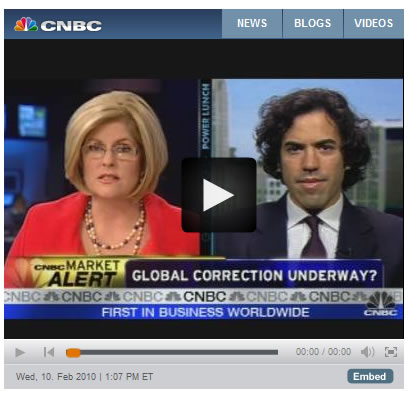Plausible Sovereign Debt Default On A Global Scale
Interest-Rates / Global Debt Crisis Feb 11, 2010 - 05:41 AM GMTBy: Dian_L_Chu
 In a CNBC interview on Feb. 10, Marc Faber of Gloom, Boom & Doom Report went out on a limb by stating that he is not buying any sovereign debt or bonds, because ALL governments will eventually default, including the United States.
In a CNBC interview on Feb. 10, Marc Faber of Gloom, Boom & Doom Report went out on a limb by stating that he is not buying any sovereign debt or bonds, because ALL governments will eventually default, including the United States.
Faber believes some countries like Singapore may fare better due to very little or no debt and large reserves; however, most of the developed world will be severely effected by Greece, bailout or not. In the near term, Faber is relatively optimistic about stocks, but still thinks precious metals will have better returns.
Meanwhile, Jon Levy with Eurasia Group, though sharing an equally gloomy view, does not share the same dire prediction. Levy believes it will be a “long and drawn-out” adjusting process different from country to country.
Sovereign Default On A Global Scale?
Back in December of 2009, Moody's Investors Service reported that there was $49.5 trillion of sovereign debt outstanding. The rating agencies are worried that governments' massive deficit-spending to pull their economies out of last year's crisis won't produce enough growth to pay for itself.
Furthermore, Moody's pointed to the U.S. and the U.K., whose public debt runs to $12.1 trillion and $1.3 trillion, respectively, as two prime candidates that could potentially lose their triple-A ratings in "worst-case scenarios." Analysts are also worried that Japan, plagued by deflation, will be unable to repay a debt that's projected to hit 220% of GDP in 2014.
Last November, the International Monetary Fund projected that the average debt-to-gross domestic product ratio of the 10 advanced country members of the Group of 20 developing and developed nations would mushroom to 118% by 2014.
Inflation & Higher Interest Rate
The recent market jitters could be a self-fulfilling prophecy. Falling bond prices and higher yields will make it even harder for governments to refinance future obligations. That, in turn, will hurt their currencies, and especially the euro zone
Sure, central banks can always print more money. More printing will inevitably lead to run-away hyper inflation, and/or the eventual monetary tightening. Higher interest rate and inflation, of course, will probably push all the sovereign strugglers over the cliff while adding a few new ones.
Either way, there will be some nasty consequences to the global bailouts and deficit spending, including a scenario where the dollar could lose its reserve status. Only time will tell.
In that sense, Faber's prediction, while considered extreme by some, is probably not all that far off.
Side note: Watch how Faber dealt a Bloomberg plug to Dennis Kneale and CNBC in response to Kneale's apparent attempt to embarrass him.
Dian L. Chu, M.B.A., C.P.M. and Chartered Economist, is a market analyst and financial writer regularly contributing to Seeking Alpha, Zero Hedge, and other major investment websites. Ms. Chu has been syndicated to Reuters, USA Today, NPR, and BusinessWeek. She blogs at Economic Forecasts & Opinions.
© 2010 Copyright Dian L. Chu - All Rights Reserved Disclaimer: The above is a matter of opinion provided for general information purposes only and is not intended as investment advice. Information and analysis above are derived from sources and utilising methods believed to be reliable, but we cannot accept responsibility for any losses you may incur as a result of this analysis. Individuals should consult with their personal financial advisors.
© 2005-2022 http://www.MarketOracle.co.uk - The Market Oracle is a FREE Daily Financial Markets Analysis & Forecasting online publication.




